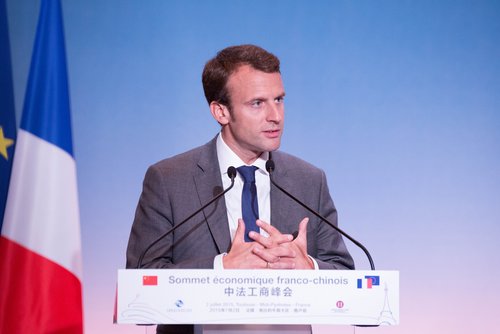No candidate has won the absolute majority in the first round of the French presidential election on 23 April. This Sunday, on May 7, the French must finally decide between the two remaining candidates – Emmanuel Macron or Marine Le Pen. The French have the opportunity to elect a president who can give new impetus to the economy.
France before the run: off
It is not very surprising that a right-wing, Eurosceptic candidate has made it to the run-off. According to European Commission surveys, confidence in the European Union (EU) in France reached a historical low in autumn last year. Only 26 percent of the French say they trust the EU, while 65 percent tend to mistrust the EU. For comparison: in Germany, the share of citizens who tend to trust the EU amounts to 37 percent. Since spring 2016, the share of French citizens, who consider the EU not to be trustworthy, increased by 6 percentage points. France ranks second when it comes to distrust of the EU in a European comparison. Only crisis-ridden Greece is more skeptic towards European structures. Confidence in the European project has drastically declined in the founding member state. Before the crisis, more than half of the French were of the opinion that the EU is trustworthy. However, long-term unemployment, high indebtedness and a generally lame economic development (Busch, 2017) have strengthened the desire for change. This is reflected by the trust placed by the French in their own government. Only 17 percent trust the current administration, 79 percent do not. Such values are more typical for Southern and Eastern European countries, where corruption and / or severe economic crises have shaken confidence in the political system. Among all EU countries, there are only three other Member States (Greece, Italy and Slovenia) where the government is less trusted than in France.
However, despite the serious structural problems of the French economy, the outlook improved in recent months. In April, the French purchasing managers index (PMI) reached the highest value in almost six years at 56.8 points. The increase in private consumption and gross fixed capital formation in 2016 by 1.9 and 2.8 per cent respectively was the highest in nine years. The start of the 2017 election year is characterized by strong optimism. Hence, a continuation of the pro-European course through the election of Emmanuel Macron as new French president is widely expected. According to recent studies, the economic policy measures he envisaged are likely to provide significant impetus to the French economy. If so, the French GDP is likely to experience an additional growth of about 0.5 percentage points over the next five years (Amiot, 2017). With a 50 billion euro investment plan, tax cuts and reforms of the tax and social insurance system, he promises a strong recovery of the economy. However, the downside risks of the election still persist. The possible victory of the Eurosceptic Marine Le Pen in the presidential elections would shatter the foundation of European integration and jeopardize the continued existence of the EU in its present form.
Moreover, the election in France has not only a national dimension. It will also have a strong impact on its neighboring trading partners like for example on Germany. In 2016, German-French foreign trade turnover amounted to 167.2 billion euros: Germany exported goods worth 101.4 billion euros and imported products worth 65.7 billion euros. As a result, Germany’s western neighbor was the second most important trading partner in exports and ranked third in imports.

Wichtige Lichtblicke
Die jüngsten Zahlen zum Wachstum des Bruttoinlandsprodukts zeigen: Die Rezession in der Eurozone ist beendet, der Länderclub hat auf den Wachstumspfad zurückgefunden. Auch in den Krisenländern zeigt sich Licht am Ende des Tunnels – vor allem in Portugal. Das ...
IW
Barrieren erschweren den Import
Die deutsche Industrie ist auf bezahlbare und zuverlässige Rohstofflieferungen angewiesen. Doch die Exportländer erschweren den Handel.
IW
